Book Reviews by Genre: Fiction
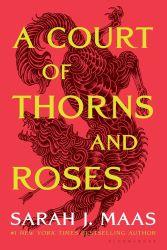
Fairies are terrifying, violent creatures; they haunt the humans’ worst nightmares. A wall and a twisted treaty are the only barriers between these terrifying creatures and the vulnerable, weak humans. However, the wall is weakening, fairies are venturing through the cracks, and the humans have long forgotten the treaty's terms.
Ferye’s family relies on her hunts, but over time, she has to venture deeper into the woods toward the wall dividing the fairies and the humans. These hunts are risky and dangerous, and it’s only a matter of time before she might have to confront a fairy. When Ferye accidentally breaks the treaty's terms, she has no choice but to follow Tamlin, a fairy, into his lands, the Spring Court. Ferye can never return to the human world and will live out her days in the fairylands, away from her family and home. She expects cruelty but finds beautiful, stunning lands and kind, generous fairies. As she adapts to her new home and overcomes her original opinions, she falls in love with the mysterious Tamlin and the fairies.
The plot is immaculate, the world-building is absolutely stunning, and the characters are enthralling; A Court of Thorns and Roses is a must-read for anyone who loves high fantasy and romance. It is one hundred percent a page-turner and will keep you enthralled until the last word.

“Before the Coffee Gets Cold” is a story about a cafe that can send you back in time, so long as you drink your coffee in a particular seat. A variety of customers come to the cafe to meet with people they’d otherwise have no chance to see. However, there are several rules. The two most important are that the present will never be changed and that the time traveler must return before the coffee gets cold.
Each story is interesting and heartfelt in its own right. My personal favorite was Hirai’s story about her sister, particularly because of how it was up in the previous stories. That’s another aspect of this book. These stories are all interconnected. Aside from the first woman, each main character is shown beforehand. This book also keeps the stories from being repetitive. There’s enough of a twist on each story, one woman wants to meet her husband who’s losing his memory. Another wants to express her feelings to her ex-boyfriend. All the reasons are different enough to keep the story fresh.
The characters are all likable too, although there are a few strange moments in the beginning. All of them are given a little backstory, but not much. All in all, it’s nice without being extraordinary.
This is a quick and cozy read that I’d recommend to almost anyone. Especially if you’re interested in speculative fiction.
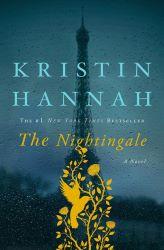
Originally I was interested in this book because it was highly praised among those who read it. It portrays two sisters and their lives in World War II. One named Isabelle and one named Vianne, it shows the different courses of their lives but in the end their own impact made on those around them. If you are interested in learned about women’s contribution in war this book is for you! I would recommend this book to anyone looking to expand their perspective on war, but be aware this book does touch on some topics that may be triggering. Overall, the Nightingale was a wonderful read that gave me more insight to women’s lives at the time and their contributions.
Grade 10
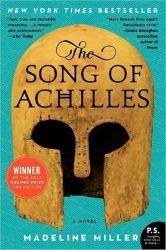
"The Song of Achilles" by Madeline Miller is a stunning and deeply moving retelling of the Iliad that captivates from beginning to end, earning a solid 5 stars. Miller skillfully weaves a tale of love, friendship, and heroism, focusing on the relationship between Patroclus and Achilles. The narrative beautifully explores the complexities of their bond, providing a fresh perspective on the legendary characters. Miller's prose is both lyrical and evocative, effortlessly transporting readers to the ancient world. The emotional depth and nuance she brings to the characters make this retelling a triumph, resonating with readers on a profound level. "The Song of Achilles" is a masterpiece that seamlessly combines rich storytelling with timeless themes, earning its well-deserved 5-star rating.
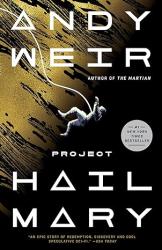
This book is amazing! it has twists and turns, and the author is amazing! The science is explained well enough that anyone can understand it. Also, whenever you think the book is done, it just goes, 'Here's another problem, Main character! good luck!" Also, the book is in the format of a 'White Room" story, meaning that the character has no memory, and has to figure everything all out, along with you! Would recommend to any sci fi fan over the age of 12.
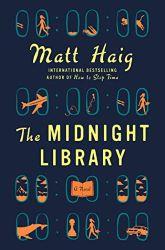
TW: A main theme of this book (and thus the review) is suicide. If this topic makes you uncomfortable, I would suggest finding a different book.
“The Midnight Library” is a story about Nora Seed, whose life has not gone how she’s expected. Worse yet, she feels as though it’s all her fault and her regrets weigh heavy on her. One night she decides to end her own life, but she wakes up in a library with her elementary school librarian. That’s when she gets the opportunity to live the lives she could have led if she’d made different decisions.
As the story goes along, we see many of Nora’s alternative lives. Some of them are just as disastrous as her regular life (her best friend dies, her husband cheats on her). Others are nearly perfect, but can’t be truly satisfying when she didn’t create them. I was glad that some of the alternate lives were good, otherwise it would have seemed like Nora’s original life was simply the lesser of two evils. All of them are interesting to read about. Another interesting aspect of the book is the library itself. The author knows when to reveal information and when to keep things vague.
There aren’t many characters to keep track of. Nora is the main character, and the reader gets a good sense of her interests and aspirations through her various lives. Her friends and family all get a decent amount of depth as well, though they’re not in focus most of the time.
I can’t pretend that I really resonated with the message of the book. I would have preferred if it focused a bit more on the good things that could happen in Nora’s future rather than the good things that happened in her alternate lives. However, that could be a problem exclusive to me.
Overall, I would recommend this book to almost anyone. It’s a fast read and a good story.

"What You Are Looking For Is in the Library" is a book about a library connected to a community center and the unusually perceptive librarian, Sayuri Komachi. The book is told through five stories of people . Along with the books they came for, Mrs. Komachi gives them an unrelated book and a felt gift. This leads them to discovering new perspectives on their problems and their lives.
All the characters in this book are delightful. Since there are five stories, each with a different main character, it would take too long to go over all of them. However, the standouts for me were Tomoka, Natsumi, and Mrs. Komachi herself. Tomoka was relatable in her struggles, but also had a proactive nature that made her likeable. Natsumi has an interesting story about motherhood that isn't seen much in modern media. And of course Mrs. Komachi tows the line between mysterious and friendly in a charming way. Every once in a while there will be a character that appears in multiple stories, and the crossovers are pleasant without being distracting.
The stories themselves are all quite simple. Someone receives insight after reading a book, usually talking with friends and neighbors as they decide on their life's path. Though they're all quite short, none of them feel incomplete or rushed.
I would recommend this book for people looking for a comforting read or a story about the power of books.
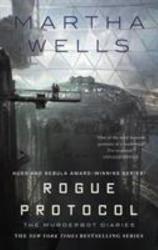
By this point in the Murderbot Diaries series, I'm used to the short length of these stories. I appreciate that there's still an overarching plot that the books are driving toward, but the bite-size adventures of the sentient AI robot are also entertaining by themselves. Now that the series is in a good groove by book three, I was glad to see the introduction of a foil to compare and contrast the main character's interactions with the humans.
The rogue SecUnit continues to find himself deeper into the shady dealings of humans, but with each interaction, he's finding it harder to hide who he is and what he's doing. That these "missions" he gives himself are a significant amount of effort for someone who would much rather be lazy and just watch vids all day seems contradictory until you realize that it's great character development—even if it's subtle. Raising the stakes with each book also helps to make this one the best one in the series to date. There has to be a point soon when things become fully out of the SecUnit's control.
It's always interesting to me how the characters that have stuck with me through the series (aside from the main character of course), are the other AIs and robots. In Rogue Protocol, I immediately fell in love with Miki, who showed the other side of human-robot relations as a pet/mascot. The contrast between Miki and the SecUnit was a fantastic plot device and I would love some kind of spinoff with those two characters (or characters like them). Unfortunately, the abrupt ending to this book left me a little disappointed, as I felt there needed to be more time with the characters to get their full range of emotions after the climax.
A great book filled with contrasting human-robot relations, I give Rogue Protocol 4.5 stars out of 5.
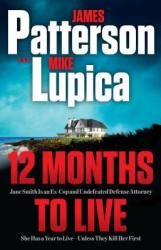
Jane Smith is a defense attorney, trying to defend a probably guilty client of three murders. Gripping, well paced with great character development.
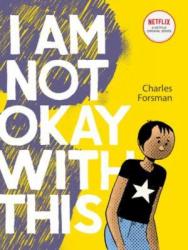
I'm open to a lot of visual styles for graphic novels. It can be what elevates a mediocre story to something profound, but it can also tonally clash with the message and leave a muddled mess. Storytelling in this format is a challenge to pull off and few have been able to do so successfully. I Am Not Okay With This unfortunately falls into the other camp here. Even if this were just a novel without the "graphic" part, there's not much to recommend it.
Filled with cliches about what it's like to be a teenage girl, I Am Not Okay With This suffers from the "men writing women" trope. None of the interactions felt believable or realistic. Instead, they seemed forced through what a man thought these interactions should be based on minimal or merely pop culture research. None of it had the feel of anyone who has lived as a teenage girl in similar situations—psychic powers notwithstanding. This was why it leaned so heavily on the tropes commonly associated with girls in puberty and the male fetishes that go along with it.
I wasn't sure if this was trying to be edgy by focusing only on heavy subjects like sexuality, bullying, and suicide, but the simplistic art style felt too childish to accomplish any of these goals with any level of gravitas. There wasn't even a satisfying conclusion to anything, which would only be frustrating if this book wasn't such a quick read. I'm sure it's less of a time commitment than watching the Netflix show, but I still probably wouldn't recommend it (even if I haven't seen the Netflix show to compare against).
A mismatched graphic novel obviously written by a man, I give I Am Not Okay With This 2.0 stars out of 5.
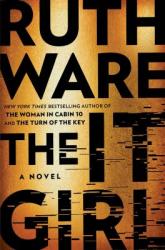
I love Ruth Ware but this was so disappointing I didn't even finish it, and I really tried. I was just so frustrated with the format and the characters that I no longer cared about the conclusion.
The back and forth format was really repetitive and annoying, and the characters all felt thin. The main character only had two modes, panic attack or despair, but the way it was written it was impossible to have empathy for her.
Her anxiety became very formulaic. The supporting characters were all very predictable, which is not good in a whodunit. I really hope she's back on her game with the next one as I liked every one of her books until now.
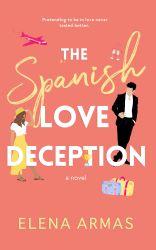
Lovable characters, an amazing plot, swoon-worthy chemistry, and a captivating writing style, what more could one ask for in a rom-com narrative? Like seriously. And those beautiful ideas are immaculately expressed in The Spanish Love Deception by Elena Armas. This book stole my heart—a truly well-done teaser love story. From the first page, Armas unfolds every parcel of the story with perfection, leaving just enough time before uncovering another equally interesting idea. The classic enemies-to-lovers trope is perfectly applied as mysterious and stone-cold Aaron meets open and bubby Catalina. At first, the motives are questionable; you’ll find yourself asking, “why would Catalina be soo adamant about finding a fake boyfriend to bring home for a wedding?” and if she hates Aaron with that much ferocity, “why did she put that aside and take him?” But as the plot unfolds, everything makes sense in a kinda sick way, and motives come to life. And through it all, Aaron and Catalina could not be more wholesome. They frankly stole my heart. It is honestly an emotional rollercoaster that I wish would never end. When it finally did, it was perfect.
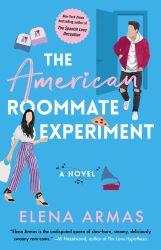
What is a better way to start a relationship with someone, your best friend’s cousin, than calling the cops on them? Answer: There is none, especially if it's a rom-com novel—the perfect first encounter. This is what happens to Rosie Graham when she unexpectedly comes across Lucas Martin, her best friend’s cousin, “breaking into her out of town friends apartment” and calls the cops. New flash, he was not breaking in; he had a key, but little did she know that this was the start of an excellent relationship and a well-written, feel-good book because everyone needs a decent, feel-good book in their lives, right? Well, at least for me, that book is not The American Roommate Experiment by Elena Armas. I mean, yes, technically, the novel is a feel-good book, but it is also so much more. It's about overcoming your past and moving forward. It’s about loving yourself and supporting others. It’s about allowing yourself to rely on others. The American Roommate Experiment is an emotional rollercoaster bundled up into 400 pages. That made me feel anywhere from devastated to ecstatic, to awe, to hate, and to love in a single chapter.
That being said, I didn’t enjoy The American Roommate Experiment by Elena Armas as much as its prequel, The Spanish Love Deception. I found the plot too slow, even for a slow-burn-type book, and overly stacked with tropes. While I enjoy a good friends-to-lovers trope, in this case, I found it extremely frustrating, and generally, I found that Lucas and Rosie lacked the necessary chemistry. I mean, water and oil have better chemistry. Both Lucas and Rosie would, in my opinion, make better friends than lovers, and the romance piece felt like an afterthought in the plot and their relationship. It is still a well-written novel with fascinating characters and a well-needed message. I adored the character development that progressed but found the romance part severely lacking. The best way I would describe The American Roommate Experiment is a modern feel-good comedy, and if that is what you’re looking for? Great. It is a perfect read, but don’t go looking for a romance novel.
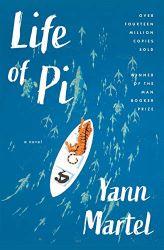
"Life of Pi" by Yann Martel recounts the major events of Pi's life before going into detail about him being stranded on a lifeboat with a tiger. It has frequent anecdotes about zookeeping and religion, especially near the beginning. The main character, Pi Patel, is an extremly likable main character. Though he is not particularly colorful or eccentric, his devotion to God and resilience make the audience instantly emphasize with him. Richard Parker, the tiger, is also made interesting. Though he doesn't do anything out of the realm of possibility, it's always left unclear how he's going to respond to the current situation. The rest of the characters are not particularly deep, but they all serve their purpose.
The plot is fairly simple, focusing more on describing Pi's struggle in detail than twists and turns. Sitting on a boat for seven months is hard to make interesting, but this book rises to the occassion. Every change in circumstance is explored, and Pi has to respond in creative ways. In between the speeches about how to train a tiger and why a hyena is dangerous, there are themes about faith that are masterfully done. While I can't say I agree with everything that's said about religion, I do appriciate how it is explored.
I would reccomend this book to animal lovers, people who enjoy survival stories, and anyone looking for a unique story that will keep them hooked.
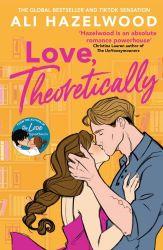
Okay, so the plot may be a little silly. A desperate adjunct physics professor, Elsie Hannaway, makes up for her pathetic paycheck by becoming people’s fake girlfriend. Does she enjoy her jobs? No. During the day, she deals with pathetic and entitled college students who couldn’t care less about physics. At night, she people-pleases to make enough to live. All while living in a probably rat-infested apartment. Whoever said academia was easy? And when she finally might get an actual well-paying job at MIT, she runs into Jack Smith, the older brother of her favorite client. Who may or may not think she works at a library?
That being said, the classic enemies-to-lovers trope and the quirky, witty characters complement the plot perfectly. The chemistry between Jack and Elsie is palpable. Frankly, Love, Theoretically, brings out the uncontrollable laughter and wholesome feelings everyone needs. However, this is definitely not my favorite Hazelwood book, and out of all the protagonists of her other books, Elsie just didn’t make the same spark. Throughout the whole book, Elsie needs constant approval from those around her, and despite being a wonderful, smart person, she lacks self-esteem. And I mean, I get it; some people have trouble with self-esteem, but Elsie’s people-pleasing tendencies are taken to too much of an extreme. And Jack, the most wholesome, caring person, sends mixed signals the whole book. The “you don’t like me” phase was too drawn out and, at times, annoying. Still, I enjoyed the light, pleasant read like always.
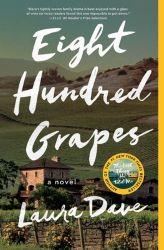
"Eight Hundred Grapes" by Laura Dave is an exceptional novel that effortlessly earns a well-deserved 5-star rating. Set against the picturesque backdrop of a California vineyard, the story intricately weaves together themes of love, family, and self-discovery. Laura Dave's storytelling prowess shines through, creating a narrative that is both emotionally resonant and utterly captivating.
The vineyard setting adds an extra layer of charm and uniqueness to the narrative, creating a vivid backdrop that complements the story's themes. The novel explores the complexities of family dynamics, the choices we make, and the impact these decisions have on our lives.
What sets "Eight Hundred Grapes" apart is its ability to balance romance, drama, and introspection seamlessly. Laura Dave's writing style is engaging, pulling the reader into the lives of the characters and making the book difficult to put down. Overall I found "Eight Hundred Grapes" to be a literary gem, offering a rich and satisfying reading experience that warrants the highest praise.
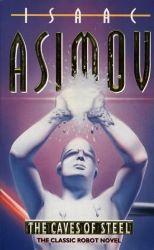
As someone who generally stays away from science fiction books, I was pleasantly surprised by this venture outside my comfort zone. Elijah Baley is the main character, living thousands of years in the earth's future. In this time period, robots have become commonplace and other planets have been commonplace. Tension has grown between earth dwellers and the residents of the other planets (referred to as spacers). There are also concerns about the increasing number and sophistication of robots. Elijah, though less extreme than many of his colleagues, is not immune to this prejudice, and is less than happy when he has to team up with R. Daneel Olivaw, a spacer robot, to solve a homicide.
The characters are not deep or complex, but they are consistent and interesting. All characters have a purpose in the story, and most of them change in some way by the end. Elijah is likable, perhaps especially so because he's allowed to fail. He's shown to be incorrect in many of his initial beliefs, and makes many false assumptions, but he retains good qualities throughout it all. R. Daneel is an interesting take on the robot archetype. Though he's shown to be effective in his job and capable of change, he lacks essential human qualities that Elijah must make up for. The side characters all have clear motivations, personalities, and are interesting without being obtrusive.
The plot strikes a balance between complex and easy to follow. There are a great deal of plot twists and dead ends, but the story takes its time and allows the reader to process everything. I hope I re-read this book one day, so I am able to look for clues to the culprit that I might have missed the first time around.
I have no overt critiques. The only bad thing I can say about this book is that it's not a deep philosophical experience. There are tcertainly hemes, but the book focuses more on excitement and intrigue than anything else. I would reccomend this book to sci-fi fans, and anyone looking to get into the genre.
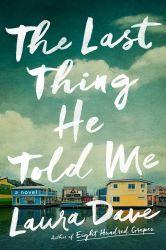
"The Last Thing He Told Me" by Laura Dave is a gripping thriller that follows the life of Hannah Hall after her husband mysteriously disappears, leaving behind a note with the cryptic message, "Protect her." As Hannah unravels the secrets of her husband's past, she discovers hidden truths and forms an alliance with his teenage daughter. The novel masterfully blends suspense with emotional depth, exploring themes of love, trust, and the complexities of family dynamics.
In my opinion, "The Last Thing He Told Me" is a well-crafted and engaging story, deserving of a 4/5 rating. Laura Dave skillfully weaves a compelling narrative, keeping readers on the edge of their seats with unexpected twists and turns. The characters are vividly drawn, and the emotional journey they undergo adds layers to the plot. While the storytelling is strong, a bit more depth in certain explanations could enhance the reader's understanding of certain character motivations and plot intricacies. Nonetheless, the book succeeds in delivering a satisfying blend of mystery, emotion, and intrigue, making it a highly enjoyable read!
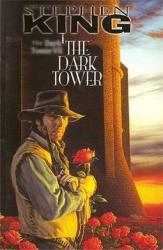
For a series that spanned over two decades, it’s nice to see that The Dark Tower ends on a titular high note. Other series may lose steam or fade to mediocrity as the stories to tell become less interesting. Or the author dies. While this series narrowly avoided this fate, the meta subplots in the last few books were well out of the way for the grand finale that is The Dark Tower. I’m almost disappointed that more of the books in the series weren’t like this, since there were actual stakes involved.
I don’t normally think of Stephen King as an “action” writer, but the fight sequences in this book were absolutely superb. These enemies had the “final boss” gravitas that made the battles so entertaining to read. That there was an incredible new superpower introduced in this book makes me wish we had more stories about that character since it was such a great ability. It’s always a mark of a great ending that I almost want to keep reading to see what else happens in this world—even with all the loose ends tied up.
King definitely understood that he was never going to write the most satisfying ending for the Roland saga since it had built up for 20+ years. His solution was a great way to both leave it as the best ending we’d ever imagine while also providing a satisfactory conclusion to the Gunslinger finally arriving at the Dark Tower. That there were as many happy endings in this book as there were made the experience of saying goodbye that much more bittersweet. The Dark Tower isn’t a perfect series, but it’s solid from start to glorious finish.
The best ending that the Dark Tower series could ask for, I give The Dark Tower 5.0 stars out of 5.
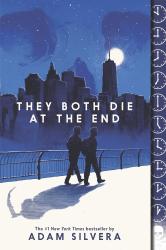
This book is amazing! The story will honestly warm your heart and keep you on your toes. The characters' development is done so beautifully and you definitely get an idea about how important life is. Don't waste another moment and please read this book!
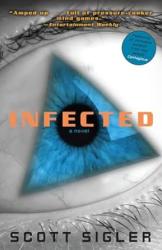
Stephen King has written most of the horror I’ve read. In deciding to branch out from the master of the genre, I saw the cover for this book in the listing of audiobooks for my library’s reader app and thought it looked interesting. While the horror here was more body/gross-out horror—which I didn’t have any issue with—there are other, deeper problems with this book. I’ll grant that in terms of audiobooks, it was an interesting recording with the sound effects and “alien voice” bits. However, I can’t say I recommend this book based on those merits alone.
Perhaps this is an artifact of the times, but a book that came out in 2008 has not aged well at all. First, is the abundance of “men writing women” tropes that not only minimize the female characters to minor roles but doesn’t consider that perhaps not everything has to be about sex. Furthermore, while the main character was a person of color, there were a lot of negative stereotypes and mildly hidden racism that came through. Reading this book made it feel like I had gotten inside the head of a “bro” guy, and it was pretty cringe.
I think the biggest problem was that this book was too cavalier with its “gross-out” factor without having enough suspense to justify the constant violence. When I didn’t care about any of the characters and the vignettes that split off to explore one-shot characters didn’t give me enough time to be empathetic for them, then who cares about the violence that happens to them? More often than not, the pacing felt so slow that I had to check how much time was left, hoping that at some point it would go faster.
A horror story that was scary for reasons other than its violence, I give Infected 2.0 stars out of 5.
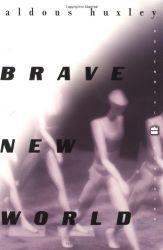
Brave New World presents a uniquely disturbing dystopia- but unfortunately, that is where its strengths end. The plot, aside from the setting, is so loosely strung together that a main character, main storyline, or even main theme is unclear. The story meanders from one under-developed character to the next and, without the support of a vivid setting, the novel would crumble. I admire the creativity behind the premise and the craft behind the writing style, but the plot simply lacks. The novel is only worth reading to delve into the vivid world that Aldous Huxley created.
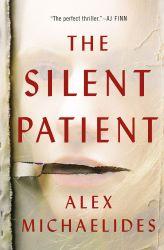
Enthralling, captivating, and unexpecting are all words that can be used to describe The Silent Patient by Alex Michaelides, an irresistible and stunning psychological thriller. The suspense from the first chapter is palpable, and the skillfully laid out plot leaves the reader second-guessing until the very end. It is truly, in the full sense of the word, a thriller, full of curveballs and red herrings, multidimensional realistic characters, thick, palpable emotions… The list goes on. Michaelides’ wonderful writing style and the perfect plot pace were just the cherry on top.
The plot is utterly outstanding. From the first words, the protagonist, Alicia Berenson, shocks the reader with an unspeakable act of violence: she killed her husband. Why? That is the sole question I found myself asking the whole book. An even bigger question: why did she fall silent after the murder? And will she ever speak again? An added layer of complexity is her new psychotherapist, Theo Faber, who is anything but perfect. Theo’s obsession with Alicia raises another question: why is he obsessed? What are his motivations? As the plot unfolds, the mystery behind Alicia’s silence uncovers vast psychological trauma and the lies of her close friends and family. As the plot thickens, Michaelides creates a haunting setting as he delves into the intricacies of the human mind. It becomes evident that this novel is well-thought-out and plentifully researched to draw the reader into a realistic setting. Honestly, I have no criticism of The Silent Patient and could not recommend it enough for anyone looking for a suspenseful plot-twisty psychological thriller.
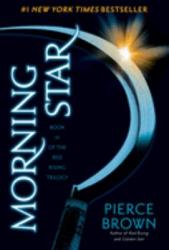
After the disappointment of Golden Son , I was leery of starting on the last part of the Red Rising trilogy. Oddly enough, this book was actually somewhat interesting, but in a way that made the first two books seem unnecessary. There was definitely a lot of action in this book, which is part of what made it more exciting than the others. And as far as a book that’s supposed to wrap up a trilogy, Morning Star certainly doesn’t leave too many loose plotlines when it ends. I still think the world-building is forced with all the Roman imagery and sci-fi tech, but at least now it’s over.
As with the previous books, I still had trouble with keeping track of all the different characters and their motivations. The main character was pretty straightforward (if not bluntly so) and his love interest just felt like she wanted to do whatever he was doing. Everyone else had weird names that made it hard to track who was who and which side they were on. At least the plot was simple enough that I could follow what was happening.
The biggest question that came from this book was, “What was the point of trying to get into (and be rejected from) the high society?” It seems to me the only reason to have the first two books was to give the main character a love interest from a caste that was above his station. I think if it could have worked some elements of the first two books into this one, then it could stand by itself. After all, the idea of an oppressed population rising to defeat their wealthy overlords is probably the most interesting concept in this series.
A trilogy finisher that could have been a standalone book, I give Morning Star 3.5 stars out of 5.
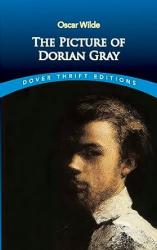
The Picture of Dorian Gray is a philosophical novel by the Irish writer Oscar Wilde. It was originally published in 1890, and soon after its publication, it became one of the best-selling books.
It circles around the doctrine of aestheticism and Oscar Wilde's role in that movement. He, along with the other writers of that movement, explained that art should not have a political or social purpose to serve, and it also has nothing to do with morality or conveying moral or sentimental messages.
The idea of "Art for the Art's Sake" played a prestigious role in Oscar Wilde's novel, which means that art needs no justification and ought only to deal with beauty. The purpose of the art is to entertain and appreciate its beauty.
"An artist should create beautiful things, but he should put nothing of his own life into them."
The tale begins with Basil Hallward, a very talented painter, making the portrait of Dorian Gray, who is sitting in front of him. Dorian Gray is a splendid young man with a beautiful nature and heart. He is also considered one of the most beautiful men in Greek mythology, like Helen of Troy. He is everything to Basil Hallward because the painter believes that this charming creature with good looks will make him a famous artist. It seems as though he is made of gold and ivory, and the curves of his lips rewrite history.
Basil Hallward makes the portrait of Dorian Gray, which seems more beauteous and charming than his own personality. When he glances at the picture, he feels jealous of his own portrait. He realizes how sad it is that I will grow old, wrinkled, and ugly, but this portrait will always remain young and lovely. As it is written in the book:
"I am jealous of everything whose beautydoesn't die. I am jealous of the portrait you have painted of me. Why should it keep what I must lose?"
Dorian Gray wishes to remain young forever. Whenever he sees his photo, sadness swallows him. He is ready to give everything for that sake, so his hedonistic nature forces him to sell his soul to the devil to get back his youth, and he also agrees that this picture will bear all his sins and doings.
As the story proceeds on, hedonism ruins him and makes him corrupt and wicked. He goes out to watch a play at the opera, where he falls in love with an actress, Sibyl Vane, not because of her beauty but because she is an excellent actress and knows very well how to please her audience. One day, he with Basil and Lord Henry go to watch her play,but unfortunately she doesn't act very well, which makes Dorian Gray furious and disappointed because art is everything to him, so he leaves her crying and in pain. After some days, she takes her life, and Dorian is responsible for that, but he doesn't think so. When he returns home and glances at the picture, he notices some changes in it. The face looks a bit pale, dark and a hint of cruelty is also seen in it. He kills Basil Hallward because he knows his secret, and Dorian is afraid that the painter might reveal to the world his real face.He sees his portrait again, and the painted face on the canvas looks sodden and unclean. The cheeks become hollow and flaccid, and the hairs lose their brightness. It gives off a monstrous look, so he decides to end it up, seizes a knife, and stabs the picture with it. There rises a cry of pian so horribly that when the servants enter the room, they see the portrait of their charming master hanging on the wall. There lies a deceased man with a knife in his heart. He looks like a monster, and all his sins can be seen on his face.With his death, the portrait returns to its original shape and looks young and attractive again.
It is a fabulous piece about the idea of art for art's sake. Oscar Wilde explains vividly that it is not the duty of art to serve society or tell others about ethics what is wrong and right. The only priority of the artist is to create beautiful things and to provide pleasure to others. The importance of art can be seen in the book:
"There is nothing that art cannot reveal or express."
"The reason I will not exhibit this picture is that I am afraid that I have shown in it the secret of my own soul."
The author warns its readers that bad external influences can exploit you ghastly. Don't let anyone overcome or make your decisions, because it happens with Dorian Gray.
Hedonistic nature is also a prestigious theme in this book. Dorian Gray is a hedonistic young man who wants to be beautiful forever without knowing that everything in this world must taste death. Don't be proud of your glory, beauty, and honor because death will swallow everything.
According to Oscar Wilde, we do everything to be famous, but once we have what we want, it no longer interests us. I don't agree with it because, for the majority of us, money, power, and fame are everything. We desire to have all this stuff, and none of us will ever want to throw it away.
In short, it's a wonderful book and contains some unique and important messages for its readers.
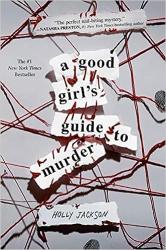
Andie Bell was murdered by her boyfriend, 5 years ago. It's a closed case. But Pippa doesn't think so. I absolutely loved A Good Girl's Guide to Murder.
The story follows Pippa Fitz-Amobi, or Pip, a 17 year-old girl whose end of year project is a solved murder case.
The "murder" of Andie Bell, and the suicide of her boyfriend that followed. Pip doesn't believe the end result of the case, and that Sal Singh, Andie's boyfriend wouldn't have murdered her.
Pip shows up at Sal's brother, Ravi Singh's door, asking for help. She tells him she doesn't think Sal did it, and wants help proving it. The rest of the book continues with Pip and Ravi doing what the police couldn't. A deep dive into Andie Bell and Sal Singh's life.
This book was very well written, and so were the other books and novella in this series. The plot twists were perfectly placed and made sense, yet not easy to guess. This was not a book to take lightly, details from the very beginning of the book would resurface.
The other books in the series connected perfectly with this one, and each page left you wanting more. There was definitely a romance subplot, as Ravi and Pip got to know each other, but it didn't take away from the mystery at any point.
Overall, I really liked A Good Girl's Guide to Murder, and would recommend it any day, whether you are just starting with mystery, or are an expert.
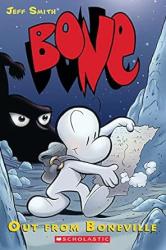
Bone is one of those comics I’ve always been aware of but haven’t gotten around to reading until now. It’s interesting how the visual style of the titular characters evokes an older style of comics, while the other characters in the world feel more modern. The storytelling runs at a pretty fast pace that kept me turning the pages to see what happens next. There’s some pretty good humor here, as well as tense situations to keep it from becoming too silly. I can definitely see the appeal and why it’s been a notable comic since its origins in the early 1990s.
My only qualm with this book has to do with the main characters. The three “Bones” feel out of place in the fantasy realm, let alone our world. It also took me a while to distinguish visually between Fone Bone and Phoney Bone, which was only aided because this book mostly follows Fone. These characters are quite expressive for their simple design, which helps. I understand their simple white design would make producing the (originally black and white) comic easier, but they’re so jarring when everything else is so detailed.
It's funny how the Japanese isekai genre has picked up in recent years, only to have been solidly pre-dated by Bone. The concept of a group of people being transported/lost in an unfamiliar fantasy world is a huge genre today. The fantasy world-building Jeff Smith does in this first volume definitely holds to a lot of fantasy tropes while also taking humorous turns that make the world unique. I’m glad I picked up the colorized version of this first volume and I’ll definitely be reading the next volume when I get the chance.
A bold take on the isekai genre in an American style, I give Bone, Vol. 1 4.0 stars out of 5.
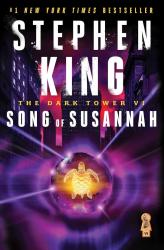
Six books into the Dark Tower series, and I'm glad that things are wrapping up. I felt Wolves of the Calla was only as good as it was because it was clearly a ripoff of The Magnificent Seven (1960). And with so many of the books in this series focusing on the men of the ka-tet, it was nice to get a book that mostly focused on Susannah's experiences. A lot of weird stuff happened in this book, but at least it laid the groundwork for the last entry in the series.
Perhaps the weirdest part of this book was its meta-narrative with Stephen King. I was a little surprised this fourth-wall-breaking move worked as well as it did. Then again, King clearly hinted that this was a possibility in the previous book in the series. Author self-inserts usually take the form of the main character living out the author's fantasies. However, literal author self-inserts are a little rarer. It also felt like King was trying to remind himself why he started on this Dark Tower series at all, which doesn't instill a lot of confidence in the reader.
I wasn't wild about the somewhat cliffhanger ending, but it didn't matter too much as I knew I could jump into The Dark Tower shortly after finishing this book. It's mostly frustrating because there are a lot of things that are cut short in this book that clearly will be resolved in the next. Song of Susannah gathered King's top ideas from his previous works, making it almost a "greatest hits" from his bibliography. That there's been some good action in books five and six of the series bodes well for the conclusion.
A meta setup for the last book of the Dark Tower series, I give Song of Susannah 4.0 stars out of 5.

The Stranger by Albert Camus is one of the most widely read novels in the world. It was originally published in French in 1942 and then translated into English as well. After its publication, thousands of copies were sold all over the world.
The novel presents Albert Camus's theory of absurdism, which says that the whole world is useless, and he also doesn't believe in this world.
The narrator of this story kills an Arab in the desert to save his life. He is brought to court by police officers on trial. He is ready to confess his crime in front of all the people and is ready for any sort of punishment, but the jury has different intentions, and he is flabbergasted when officers start questioning him about his mother, who died a few days ago. They blame him for not weeping at his mother's funeral. He might be forgiven for his crime, but he could not be pardoned for not crying when his mother died. He is ghastly criticised by all the members of the jury because he went to the pool and watched a funny movie with his girlfriend after his mother's death. After a few days of hearings, the court announces his death sentence, and no one has tried to find the elicit facts, as they are mentioned in the text book.
"After being charged with murder, he executed because he didn't weep at his mother's funeral. "
After suffering throughout his whole life and witnessing the deplorable behaviour of others, he no longer believes in God. His heart got badly broken, and the existence of God has no importance to him anymore.
The importance of memories is another big theme in this novel. Memories are very important in life, and they last forever, even till death. I must say:
Life without memories is like a broken-winged bird that cannot fly.
When he is sent to jail, he has only the memories of his life and spends his time remembering the beautiful moments of life and the time he spent with his beloved ones. As it is written in the novel:
"I have learned that even after a single day's experience of the outside world, a man could easily live hundreds years in prison "
To conclude, the novel is a wonderful piece of literature because it explores the real events of the writer's life and contains some important lessons for others. That's why reading this book would be a good idea.
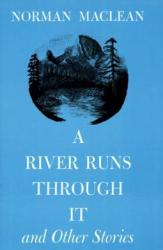
I love how books can give insight into things we might not otherwise know. How, when someone "writes what they know" in an autobiographical sense, the reader gets to experience that slice of their life. I'm not interested in fishing—in any of its styles. And yet, A River Runs Through It gave such a clear picture of what it's like to go fly-fishing that I felt like I had actually experienced it. I'm still not interested in trying it in real life, but now I feel like I get it.
Of course, A River Runs Through It isn't entirely about fly-fishing. There are other universal themes, like fatherhood, brotherhood, sonship, and unity with nature. I can also appreciate that there is a Christian tilt to the main character without being judgmental of the choices his family has made. This unconditional love speaks to what Christianity is all about. That's not to say that the actions of his family aren't frustrating to read about, it's just that going fly-fishing is something that washes away any bad blood.
While it's a quick read, A River Runs Through It doesn't need much to convey the author's genuine attitude toward life. Because it's not about the details of actually fly-fishing that reveal how knowledgeable Maclean is at the sport. There weren't any facades that tried to paint the main character as a saint. All the characters had flaws, just some were more obvious than others. An accurate examination of an individual's life says more about what they've accepted than what they wish they'd wanted to be. And perhaps being in the "natural environment" where they're the most comfortable is the whole point of this book.
A heartfelt love letter to family and fly-fishing, I give A River Runs Through It 4.0 stars out of 5.